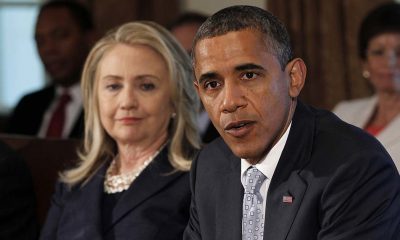World
Driverless cars good for our future: Study

New York: If driverless taxis roaming our cities become a reality, they would not only help cut our expenses but would also greatly reduce emissions of greenhouse gases, says researchers, including one of an Indian-origin.
The per-mile greenhouse gas emissions of an electric vehicle deployed as a self-driving, or autonomous, taxi in 2030 would be 63 to 82 percent lower than a projected 2030 hybrid vehicle driven as a privately owned car and 90 percent lower than a 2014 gasoline-powered private vehicle, the researchers calculated.
The study was co-authored by Jeffery Greenblatt and Samveg Saxena from from Lawrence Berkeley National Laboratory (Berkeley Lab), a US Department of Energy National Laboratory Managed by the University of California.
“When we first started looking at autonomous vehicles, we found that, of all the variables we could consider, the use of autonomous vehicles as part of a shared transit system seemed to be the biggest lever that pointed to lower energy use per mile,” said Greenblatt.
Almost half of the savings was attributable to “right-sizing,” where the size of the taxi deployed is tailored to each trip’s occupancy needs.
Many automakers and other companies are working on autonomous cars. Right-sizing is cost-effective for both the fleet owner and for passengers, and small one- and two-seat vehicles are being explored by researchers and companies.
To illustrate the concept, consider a single passenger with no luggage versus a party of four passengers with suitcases. The single passenger would require a much smaller taxi than the party of four, saving money for vehicle owners and passengers. Right-sizing, of course, assumes a fleet of taxis managed by a single entity.
“Most trips in the US are taken singly, meaning one- or two-seat cars would satisfy most trips,” Greenblatt said.
“That gives us a factor of two savings, since smaller vehicles means reduced energy use and greenhouse gas emissions,” Greenblatt added.
Another factor contributing to lower emissions for autonomous taxis is a cleaner electric grid. By 2030 power plants are expected to be using more renewable energy and emitting less pollution, meaning the greenhouse gas intensity of electricity would be lower.
The researchers also conducted an economic analysis to determine how cost-effective autonomous taxis would be. An autonomous taxi using today’s technology would be cheaper than an ordinary taxi not simply due to its greater energy efficiency, but also due to the fact that no operator would be required.
By 2030, autonomous taxis could be far cheaper than their driven counterparts, researcheres said.
The results were published online in the journal Nature Climate Change.
National
Foodman Vishal Singh Honored for Hunger Free World Mission in Bangkok

Lucknow: Vishal Singh, a renowned social worker from Lucknow, also known as Foodman, has once again made India proud. He was honored by the Happy Hands Gloves Cooperative Limited Company in Korathai, Thailand, for his work with the Hunger Free World Mission.
The Hunger Free World Mission’s meeting was held in Korathai, Thailand, under Vishal Singh’s leadership. Representatives from several countries, including Mr. Raja Dwivedi (Managing Director of Happy Hands Gloves Limited), Thailand Coordinator Mr. Raja Mishra, and member Mr. Varun Singh, attended the event.

Under Vishal Singh’s leadership, the attendees took a pledge to work together toward creating a hunger-free world.
Speaking on the occasion, Vishal Singh explained that the main goal of the Hunger Free World Mission is social participation. He said the mission is not just about feeding people but also about meeting other basic needs of those who are struggling. The mission focuses on helping families of terminally ill patients in hospitals by providing food and shelter. It also works to fulfill essential needs like education, jobs, and care for the elderly.
For the last 16 years, the Vijay Sri Foundation has been providing free services, benefiting thousands of people. Vishal Singh highlighted that the mission aims to gain global recognition like other organizations such as WHO, WWF, and Red Cross, which work for social causes.
During this meeting, Vishal Singh was appointed as the Chairman of the Hunger Free World Mission by representatives from various countries. They also discussed holding regular meetings in different countries to push the mission forward.
Business tycoon Dr. Abhishek Verma has also supported this humanitarian mission, vowing to promote the idea of “Seva Parmo Dharma” (Service is the highest duty) worldwide. Vishal Singh praised him, stating that people like Dr .Abhishek Verma inspire others to work for the betterment of society.
Recently, Romania’s Ambassador, Mr . Daniela Sezonov Ţane, invited Vishal Singh to the Romanian Embassy in Delhi, where they discussed the mission in detail. Impressed by his humanitarian work, she honored Vishal Singh and invited him to Romania to take the mission forward .
Food man Vishal Singh has been serving the people of India for the past 16 years. Through the Vijay Sri Foundation, he provides free meals to cancer patients & their families ,shelter, and education for women & children along with running free old-age homes in Lucknow.
In addition to his humanitarian work, Vishal Singh also addresses issues like crime and corruption through his role as Chairman of Seva Path Media and Managing Director of Vijay Sri Foundation.

During the COVID-19 pandemic, Vishal Singh and his team worked tirelessly to provide food and help to the needy, including starving children, elderly citizens, and pregnant women. Despite contracting the virus himself, he continued to assist others after his recovery. He even created a life-saving oxygen regulator using household items, which was praised by doctors both in India and abroad.
In his address at the meeting, Vishal Singh spoke about his mission to create a hunger-free world. He pointed out that India’s large population, along with issues like unemployment and poverty, has caused the country to fall on the Hunger Index. He urged people to contribute just one handful of grains daily to help create a hunger-free world.
He concluded by saying that through social participation, we can empower the people around us, meet their basic needs, and work together to build a stronger, more prosperous, and developed society.























